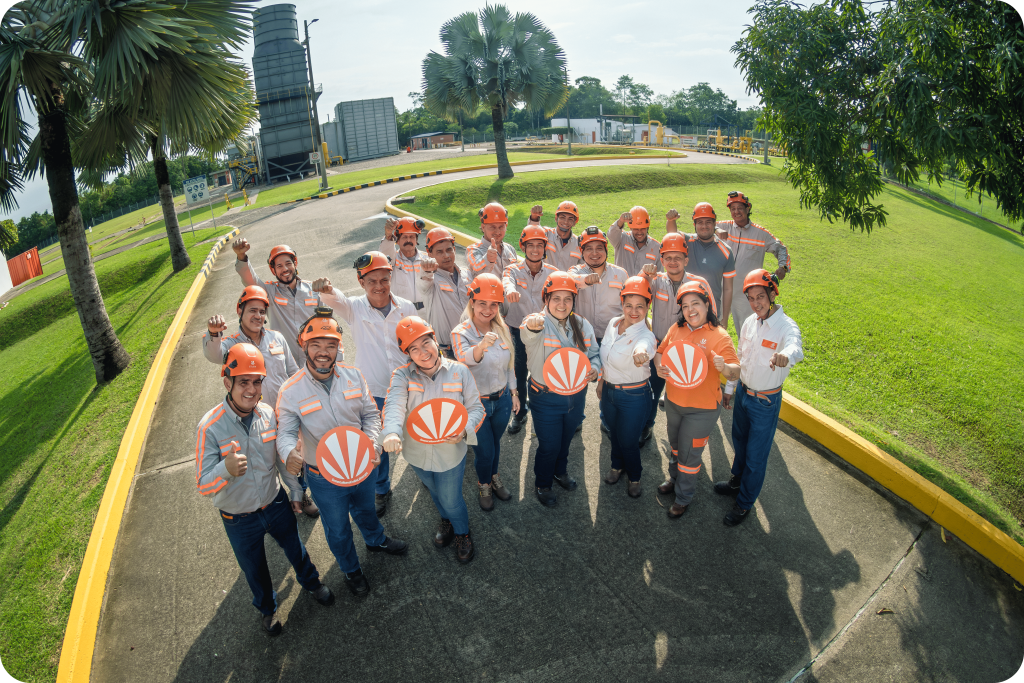We create social value
We promote individual well-being, corporate productivity
and efficiency, and regional development;
working jointly and closely with our stakeholders to achieve this..
At Celsia, we are convinced that in order to create shared value in the long term and achieve our purpose of being a company that stands the test of time, the relationship with our stakeholders is fundamental. Therefore, based on our Stakeholder Engagement procedure and our Social Policy, we focus on maintaining a permanent, transparent and trusting dialogue that allows us to become allies. To this end, we analyze risks and opportunities and establish communication strategies to receive, manage and address their concerns, complaints, suggestions, comments and expectations.
To define, maintain and update relationship strategies appropriate to each stakeholder group (interested parties in a specific context associated with our operation) and that respond to the specific local contexts in which company-community relations are developed, at Celsia we develop socioeconomic, political and cultural characterization processes, based on the instructions designed specifically for this purpose, which are part of the corporate guidelines that guide the social management of our organization.

Social Management
Social management is essential to the sustainability and development of communities. Based on our understanding of the context and social stakeholders, we foster respectful and mutually beneficial relationships, ensuring participatory and transparent processes. To achieve this, we implement relationship strategies and strengthen our social management with actions that include, among others, innovation and learning, risk management, identification of opportunities and expectations, always aligned with the particularities of each territory. In addition, we promote integral development and the implementation of responsible and inclusive operations.
This is how we do it:
-
1
Characterization: In general, we characterize all stakeholder groups and have a guide for analyzing the socioeconomic, political, and cultural characteristics of the communities in our areas of influence, based on the strategic risk and the material issue that this specific group represents for the company.
-
2
Dialogue and Participation: With all stakeholder groups, we develop relationship and communication strategies that allow us to understand their perceptions of our projects, activities, and impacts. For the community stakeholder group, we have a guide that sets forth guidelines for informing, engaging, and consulting with stakeholders (ethnic, non-ethnic communities, and other social actors). In this way, we promote their participationin understanding our projects, identifying impacts (positive and negative), and formulating management measures that incorporate their perspectives
-
3
Engagement: We foster ongoing spaces for interaction such as meetings, field visits, workshops, and roundtables. We also ensure respectful and timely responses to communications (requests and complaints) from all stakeholder groups, and we use a range of communication tools including our website, social media, WhatsApp, radio, press, and newsletters
-
4
Local Development: We promote local development by hiring local labor and developing social investment projects, strengthening community capabilities, and managing strategic partnerships to maximize the positive impact of our operations.
-
5
Communication Handling and Transparency Hotline: We handle requests and complaints through a permanent response mechanism for stakeholders, including customers and communities. We also provide a secure and confidential channel,managed by third parties, to report misconduct or violations of our policies
Learn more about our Transparency Line.
Documents Supporting Social Management
To formulate our documents, we follow the Equator Principles, IFC-2012 Performance Standards, AA1000 Methodology, and the Guiding Principles on Business and Human Rights. Learn more here by clicking on each of them:
Stakeholder Engagement Procedure.
Political and Cultural Characterization.
Information,Participation, and Consultation.
In 100% of our assets and projects in Colombia and Central America, we carry out participatory processes with the communities to evaluate and manage the impacts and risks associated with the company’s operation in their territories. Our goal and commitment are for everything we undertake within the framework of our social management to always have 100% coverage of our operation centers and new projects.
Social Investment Strategy
Based on our knowledge of communities and their environments, this strategy includes both voluntary and mandatory actions defined through direct consultation processes.
Mandatory Investments:
These address the impacts generated by the construction, operation, and maintenance of the organization’s projects and assets. They result from agreements in prior consultations, social measures outlined in a EMP, provisions by environmental authorities, or legal requirements.
Voluntary Investments:
Initiatives of common benefit that address pre-existing conditions in the territories, unrelated to the operational impacts. These represent an opportunity to become partners in their development.
Strategic Lines of Social Investment at Celsia:
Improvement of Quality of Life: Community infrastructure, health and environment, culture, recreation, and sports.
Promotion of Education: School infrastructure, environmental education, provision of educational supplies, and capacity-building for teachers.
Community Development: Strengthening grassroots organizations, productive projects, and mechanisms for citizen participation.
Access to Energy: Electrification using internal resources, project management with funds, promotion of efficient energy use, standardization of connections, and improvement of internal networks..
Click here to learn more about our social programs for affordability and/or access to clean energy and/or water.
Click here to see a breakdown of our social investment by line of action, by type and by activity

▸Requests and Complaints
At Celsia, we apply our Communications Management Guidelines on a daily basis. Their objective is to establish the procedures for receiving, recording, managing, and responding to requests and/or complaints from communities and other social stakeholders located in the organization’s areas of influence, thereby strengthening cordial and timely relationships through satisfactory engagement.
▸Prior Consultations
The agreements protocolized with the communities in the framework of prior consultations are focused on addressing the impacts generated by our projects, through the definition of management measures that are part of the Environmental Management Plan and/or specific agreements. It is important to be clear that these measures are not generic, but are defined according to the type of project, the particularity of each community and their relationship with the impact.
▸Works for Taxes
At Celsia, our premise is to be partners in the development of the territories in which we operate, because we are motivated by well-being, innovation and sustainability. We have participated in the Works for Taxes mechanism since 2017, led by the Territorial Renewal Agency (ART, for the Spanish original) of the National Government, in which we allocate up to 50% of our income taxes to carry out works that benefit our neighboring communities. To date, we have committed COP 226 billion to developing 28 projects in the departments of Antioquia, Cauca, Sucre, Tolima and Valle del Cauca, benefiting nearly 364,000 people in 55 municipalities.
This process has been carried out by coordination and collaborative work with Governors’ Offices, Mayors’ offices, the ART and the Ministries of Education, Transportation and Environment, related to executing the projects. In this way, we have contributed to improving the living conditions of the communities in the municipalities most affected by poverty and violence in Colombia. We hope to continue contributing to the social development of the country through our participation in Works for Taxes, an effective strategy to obtain greater understanding between the public and private sectors and promote permanent dialogue to understand the interests and incentives of both sectors
Learn more about ours previous consultations and
the progress of projects in works for taxes.
Find here the results of our management in we create social value in 2024.
Click here for our EGS Databook with details of all ESG indicators.



